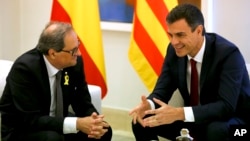The new leaders of Spain and Catalonia have agreed on opening a bilateral dialogue over the future of the prosperous northeastern region in the first breakthrough in the years-long political standoff between the central and regional governments.
Prime Minister Pedro Sanchez and Catalonia's President Quim Torra disagreed on the divisive issue of self-determination, but agreed on improving social, economic and other issues affecting Catalans, Deputy Prime Minister Carmen Calvo said after Monday's 2.5-hour-long meeting in Madrid.
The encounter yielded, according to Calvo, "a good image with content for our country's democracy."
Torra described the meeting as "long, sincere and providing frank dialogue" and said that he had felt "listened to."
But he said there were deep differences regarding his proposal of a legal referendum on Catalonia's independence as the only way out of the political deadlock, and the situation of Catalan politicians imprisoned for the secession attempt late last year.
Calvo said that Sanchez reminded his guest that self-determination is not allowed under Spain's 1978 constitution.
"We have the obligation to defend the constitutional order," the deputy prime minister said. "We know there is a political project seeking independence for Catalonia, but Catalonia can still improve in many aspects that are attainable."
Sanchez had offered instead to unblock regional legislation on social issues affecting energy consumption, health services or poverty alleviation, among others. Both sides agreed to re-establish a forum to discuss infrastructure projects and other investments unrealized by the previous conservative administration, Calvo said.
Both politicians, newcomers in their respective positions, also agreed to a second meeting later this year in Barcelona.
Torra arrived for the meeting displaying on his jacket a yellow ribbon that has become a symbol for those seeking the freedom of the imprisoned Catalan separatists.
According to the Catalan government, he gave Sanchez a book about a Catalan valley that enjoys a great degree of self-government, a compilation of medieval maps of Catalonia and a bottle of traditional liquor from his hometown.
The meeting ended with a stroll in the gardens of the Moncloa palace, the seat of the Spanish government, in the outskirts of the Spanish capital.
That image of cordiality with the backdrop of the palace had been unthinkable until last month, before Sanchez defeated the former prime minister Mariano Rajoy in a parliamentary no confidence vote.
Rajoy's conservative cabinet had been at loggerheads with the separatists in Catalonia over a banned referendum of independence, challenging in court every move by the regional Catalan authorities.
The vote was finally held amid a violent crackdown by police sent in by Madrid, and the unilateral declaration of a new Catalan republic that followed was never implemented after central authorities seized control over the region.
Catalonia remained part of Spain but the secession attempt unfolded the worst crisis in more than four decades of Spanish democracy. It also led to the imprisonment of some separatist politicians, while others fled to self-imposed exile. It took seven months for Catalonia to regain self-government after Torra was appointed as regional president.
His predecessor, Carles Puigdemont, skipped a court summon and fled to Brussels. He's now living in Hamburg, Germany, where he's fighting extradition to Spain.
Polls and recent elections show that the 7.5 million residents of the wealthy region are roughly split down the middle over the question of independence, although a great majority favors a referendum agreed by the state to decide the issue.
Spanish, Catalan Leaders Meet to Bridge Gap over Secession

MADRID —



